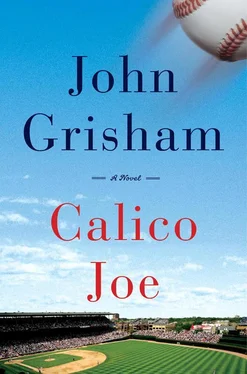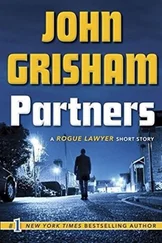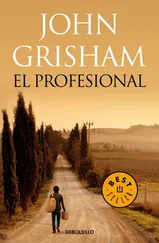“He’s here every day?” I ask.
“Five days a week.”
“It’s the middle of August. There won’t be another baseball game until, what, March?”
“Middle of March, if it’s not snowing.”
“So why does he cut the grass and prepare the field every day?”
“Because he wants to. It’s his job.”
“He’s paid?”
“Oh yes. Joe came home just before Christmas of 1973. He spent two months in a hospital in New York, then the Cubs flew him to Chicago, where he spent several weeks in another hospital. Red and Charlie drove him home in time for Christmas. He was talking about playing some more, but we knew the truth. Just after the first of the year, he had the stroke, a massive one. He was at home, by himself, and by the time they got him to the hospital in Mountain Home, there was some damage. His left side is partially paralyzed. You’ll see when he walks.”
“Does he know we’re up here?”
“Yes. He saw us park, walk over, find a seat. He knows we’re talking about him. It’s likely he will not get close enough to say hello, and before the day is over, either Red or Charlie, probably Charlie, will call me and want to know what I was doing here and who I had with me. I’ll tell him you’re my nephew from Texas, a high school baseball coach who wanted to admire our field.”
“Okay. Back to the story. Why is Joe paid to take care of the field?”
“After the stroke, it was obvious he was disabled and needed a job. So the school system hired him as a custodian, full-time with health insurance and pension, and for thirty years Joe has been taken care of. He works on the field, putters around the gymnasium, and when the baseball team has a game, he sits up here in the press box and works the scoreboard.”
“What a great idea.”
“We take care of each other here in Calico Rock, Paul. Especially Joe.”
Joe finishes a long sweeping cut, from the right field foul line to the left, then whirls around for another one. The mower is close to the outfield warning track. If the blades are actually clipping the Bermuda, I cannot detect it. The uncut portion looks as pristine as the swath he’s just finished.
“What are you thinking?” Clarence asks, firing up his pipe again.
“What could have been. Where would Joe be now had it not been for the injury. How great could he have been?”
“That’ll drive you crazy. I did it for years, then realized it’s a waste of time. The story of Joe Castle is nothing but a great tragedy. It’s difficult to accept, but after a while you try to move on.”
“Is it a good idea for Warren Tracey to come here, to meet with Joe?”
A long puff, a large cloud of smoke. The temperature has to be close to ninety already, and I wonder how a person can enjoy smoking in such heat. “You know, Paul, sitting here as we are, it seems impossible that your father would show up, shake hands with Joe, and talk about their past.”
“Yes, it does.”
“Do you really think you can convince him to come?”
“I’m going to try, Clarence. I think I can do it.”
“How?”
“Blackmail.”
Joe turns for the final swipe at the outfield grass. He has yet to look in our direction.
“I don’t suppose I want to get into that,” Clarence says.
“No, you don’t.”
We watch and listen to the mower. Finally, Clarence says, “Yes, in my worthless opinion, it would mean a lot to Joe if Warren Tracey shook his hand and offered his apology. The two have never spoken, never met since that night. It strikes me as a good idea. But how in hell can you pull it off?”
“It’s a long shot, Clarence. But I need your help. I want you to speak to his brothers and clear it on this end. Otherwise, I’m wasting my time.”
Joe parks in foul territory outside the left field line and turns off the mower. He swings his right leg over, braces himself, and hops down. He grabs a cane and shuffles toward a storage shed. He walks with a pronounced limp, with his left foot dragging behind, his right foot advancing in stutter steps, his shoulders dipping as he slowly moves forward.
“That poor guy,” I say, and a part of me feels like crying. That beautiful young kid who could fly from home to first in under four seconds, who stole second and third back-to-back seven times in thirty-eight games, who turned lazy singles into thrilling doubles, that magnificent athlete with greatness emanating from every part of his game, has been reduced to a crippled custodian who mows grass that does not need mowing. Just the thought of it—when Joe was thirty years old and should have been in the prime of a great career, he was, instead, doing exactly what he is doing now.
“Very sad,” Clarence adds. Joe disappears into the storage shed. “We probably won’t see him again. I guess we should leave.”
* * *
As we return to Main Street, Clarence agrees to approach Charlie and Red and explore the idea of a meeting. I repeat the obvious: Warren does not have long to live. There is no time to waste.
We stop by the Calico Rock Record , where I find a cup of coffee. It takes a while to say good-bye. We have enjoyed our time together and sincerely hope we meet again soon. Leaving the town, I have no idea if I will ever return.
Four hours later, I am in Memphis. I fly through Atlanta on my way to Tampa, where I rent another car and drive east, toward Winter Haven.
14

Long after the police officer left, my mother and I sat in the den and watched westerns. The doors were bolted; the shades were drawn; every light in the house was on; the officer promised to patrol our street; and we were still afraid. Perhaps we should have dismissed the call as a prank by an irate Cubs fan who found our number in the phone book, but it felt much more serious than that. We had never received such a threat, and given the trauma and emotions of the night, we were unable to shrug it off and go to sleep.
During a commercial, my mother asked, “How did you know he was going to hit Joe Castle?” She was on one end of the sofa, I was on the other, both of us were still dressed.
“Because that’s the way he plays baseball,” I replied.
“Why do they allow beanballs?”
“I don’t know. I’ve never heard a good reason.”
“Such a stupid sport,” she said.
I didn’t argue. We were also afraid that Warren might stagger home and cause trouble. He had been forced off the field with a bloody nose, so he wasn’t badly injured in the brawl. But if he wasn’t home by 3:00 a.m., he wasn’t coming home. He was probably in a bar, showing off his bruises, bragging about his skills as a beanball artist, and no doubt taking credit for the Mets win.
I dozed off, but at 6:00 a.m. my mother nudged me and said, “Here’s the news.” Channel 4 out of Manhattan began the day at 6:00 a.m. with news, weather, and sports, and they didn’t waste time getting to the story. “A wild night at Shea,” the reporter gushed as the footage rolled. From a camera somewhere near the Mets dugout, the tape showed the beanball and Joe going down. Again, in slow motion, and again as the reporter described it in detail. He said that Joe was in serious condition at Mount Sinai Hospital in Manhattan.
At least he was alive.
Next up was the brawl, and just as in real time it seemed to go on forever. Having been an eyewitness, I had seen enough. The entire episode made me sick and depressed, and as I realized later, it would turn me against the sport.
When the sun was up, I walked to the end of the driveway and retrieved the New York Times . I glanced up and down the street to make sure everything was safe but at the time did not realize I would be looking over my shoulder for many months to come.
Читать дальше












